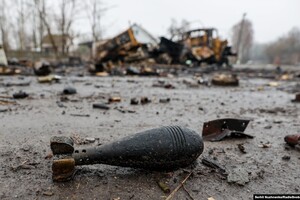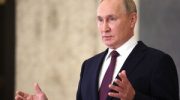The American Lend-Lease will provide Kyiv with the necessary weapons, but a new strategic vision is needed to contain and defeat Putin.

Democracies opposed to Russia's war against Ukraine , clearly stated that Vladimir Putin should lose. However, they did not specify what the defeat was. The Minister of Foreign Affairs of the United Kingdom Liz Trass on Wednesday offered something in this field. And her words deserve more careful evaluation.
This was reported by Bloomberg, recalling that her speech at the Mansion House was dedicated to the “return of geopolitics.” Trass stressed that victory in the war in Ukraine is a “strategic imperative” that will require providing the Armed Forces with heavy weapons, including tanks and aircraft, as well as reviving arms production. All talk of limited defense assistance to Ukraine has disappeared. But this change came after the massacre in Bucha, which was staged by the Russian army. The Joe Biden administration has also stepped up its support. In particular, she asked Congress to allocate an additional $ 20 billion for military aid under the Lend-Lease for $ 33 billion. This program is based on the one launched during World War II to defeat Adolf Hitler's army.
But Trass went beyond previous US statements about a free and independent Ukraine or a weakened Russia. She made it clearer what Britain sees as the ultimate goal of helping Kyiv.
“We will continue to act more quickly to oust Russia from the entire territory of Ukraine,” Trass said, adding that the term “all of Ukraine” refers to every region occupied by the Russian army, including Crimea.
This means that the boundaries within which Ukraine existed before the full-scale invasion on February 24 are no longer considered acceptable. The only question is who are “we” in the statement of the British Minister?
Read also: Russia's war against Ukraine may last for years – Stoltenberg
If Trass is talking about the UK, which is the only country it represents, then the effect will not be significant. It's as if a student is telling several classmates that he will deal with a school bully. Britain is a medium-sized power in the world. But in the field of international security, it is taking on more than it should, because of its close relationship with the United States, its permanent seat on the UN Security Council and perhaps its status as the world's second-largest arms exporter. Yes, soft power gives some leverage. But no matter how much Ukrainian President Volodymyr Zelensky praises Prime Minister Borys Johnson, Britain cannot expel Russia from Ukrainian territory. The track, of course, knows about it. As she is called Johnson's potential successor, the minister's words were primarily aimed at the inner listener. However, they set the bar for the United States and other NATO countries, as well as all democracies in the world.
For months, politicians have focused on what they call “escalation avoidance.” There were two arguments for this. The first is that despite all the sympathy for Ukraine, Western interests are limited until Putin decides to attack NATO. And many Republicans in the United States have shared this approach. But this argument has already lost its force, and not only because of the humanitarian catastrophe in Ukraine. The implications of Putin's behavior for the global economy and security are deepening.
“The desire to avoid escalation has persuaded Putin to redouble his aggression,” the article said.”If Putin succeeds, Europe will suffer unspeakably and the world will suffer dire consequences. We will never feel safe again, “said Trass.
And she is right. Russia will turn any territory it manages to into a military base. When Biden presented the land lease program to Ukraine to Congress, he spoke in the same vein.
The second argument limiting military aid to Ukraine was the “trapped rat” theory, which sought to explain Putin's behavior. They say that if he has no way out, he will despair and may use nuclear or other prohibited weapons. But all the solutions offered to Moscow did not succeed.
“They did not prevent atrocities in Bucha, Mariupol or other massacres. Last week, Putin tested an intercontinental ballistic missile capable of carrying a nuclear charge. This week, he threatened a “lightning” response to those who intervened to help Ukraine. He cut off Poland and Bulgaria from gas supplies, and also began to threaten Moldova, “the article reads.
Read also: WP: War in Ukraine can become for Russia what Afghanistan has become for the United States
In his behavior, Putin is guided by expressionism and the logic of antagonism. NATO's transparency of a high threshold for its intervention has given the Russian autocrat more room for maneuver. Trass's stronger rhetoric, if it spreads beyond Britain, could help establish a sense of strategic uncertainty that will force Putin to pause. Responding to the Russian threat requires a long-term policy of Ukraine's powerful armaments, as well as a search for ways to reduce Russia's financial and military capabilities to wage war. It looks like it's already happening. However, a new strategic concept is also needed to allow for preventive intervention.
Trass determined that the victory will be the return of Ukraine to the borders by 2014. And it raises rates a lot. However, Putin's constant threats with Russian nuclear weapons have increased them even earlier. The British minister acknowledged that a more decisive path carries risks. There is always a threat that an indirect war will turn into an open one. It is in the interests of the United Kingdom and NATO to prevent this from happening. But avoiding escalation in an effort to reduce the price is exactly what has made Ukraine vulnerable and increased wider security risks. Restraint without reliability does not work. Britain and its allies must accept the possibility of escalation because, as Trass said, “inaction is the greatest provocation.”
SeeIn the temporarily occupied territories of Donetsk and Luhansk regions, students are forced to donate blood for the wounded occupiers – Denisov There are 700 cases of forced blood donation. Ukrainians estimate less than 30% of arms supplies as sufficient diplomatic assistance to partners The Armed Forces liberated the village of Ruska Lozova in Kharkiv Region: Kazansky explained why it is a strategically important settlement The OP is convinced that hostilities will also begin in Russia: “We will watch with interest” lubricants will only increase. Olena Shulyak. What will happen to the government after the war? The Servant of the People chairman on the audit of the government, “bloated oligarchs” and the postponed fight against corruption


